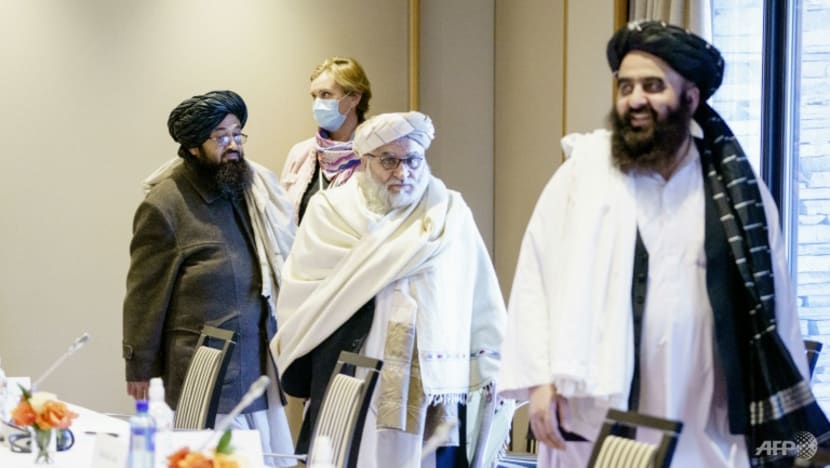Norway says putting 'tangible demands' to Taliban at aid talks

Foreign minister Amir Khan Muttaqi (R) has led the Taliban delegation at the Olso talks focused on aid. (Photo: NTB/AFP/Stian Lysberg Solum)
OSLO: Norway said it would press the Taliban with "tangible demands" during talks in Oslo on Tuesday (Jan 25), the last day of the hardline group's controversial first visit to Europe since returning to power in Afghanistan.
A Taliban delegation led by Foreign Minister Amir Khan Muttaqi has been in Norway since Saturday for talks focused on aid to Afghanistan.
The humanitarian situation has rapidly deteriorated since the Taliban returned to power in August 2021, when international aid came to a sudden halt, worsening the plight of millions of people already suffering after several severe droughts.
The Taliban delegation met members of Afghan civil society on Sunday, followed by Western diplomats on Monday.
They were to wrap up their visit on Tuesday with several bilateral meetings, including with a Norwegian political official, and discussions with non-governmental organisations.
"This is not the beginning of an ... open-ended process", said Norwegian state secretary Henrik Thune ahead of his talks with the delegation.
"We are going to place tangible demands that we can follow up on and see if they have been met", he told Norwegian news agency NTB.
The demands were to include the possibility of providing humanitarian aid directly to the Afghan people, according to NTB.
It was also to call for human rights to be respected, in particular those of women and minorities, such as access to education and health services, the right to work, and freedom of movement.
MISSING WOMEN ACTIVISTS
While the Taliban claim to have modernised, women are still largely excluded from public-sector employment and most secondary schools for girls remain closed.
Norway was also expected to raise the plight of two women activists who went missing in Kabul last week after taking part in a demonstration. The Taliban have denied responsibility.
The Taliban were toppled in 2001 but stormed back to power last August as US-led forces began withdrawing.
They view this week's meetings - held behind closed doors in a hotel near Oslo - as a step toward international recognition and the unblocking of financial aid.
"Norway providing us this opportunity is an achievement in itself because we shared the stage with the world," Foreign Minister Muttaqi said Monday after talks with representatives of the United States, the European Union, Britain, France, Germany, Italy and Norway.
No country has yet recognised the fundamentalist regime, and Norway has insisted the talks do "not represent a legitimisation or recognition of the Taliban".
About 55 per cent of the Afghan population is suffering from hunger, according to the United Nations. But the international community is waiting to see how the Taliban intend to govern before unblocking any aid.
"We cannot save lives unless all the sanctions are lifted", the head of the Norwegian Refugee Council, Jan Egeland, told AFP before sitting down with the Taliban.
Freezing aid is "hurting the same civilians that the NATO countries spent hundred of billions on defending until August", he said.
A spokesman for the Taliban foreign ministry said the delegation also held bilateral talks on Tuesday with a senior French foreign ministry official, Bertrand Lotholary, and EU special representative Tomas Niklasson.
Oslo's decision to host a delegation has been criticised by some experts and members of the Afghan diaspora. Several protests have been held outside the foreign ministry in the capital.
Among the 15 members of the all-male Taliban delegation is Anas Haqqani, a leader of the most feared and violent faction of the Taliban movement.
The Haqqani network has been blamed for some of the most devastating attacks in Afghanistan, and a Norwegian-Afghan has filed a police complaint in Oslo against him for war crimes.










